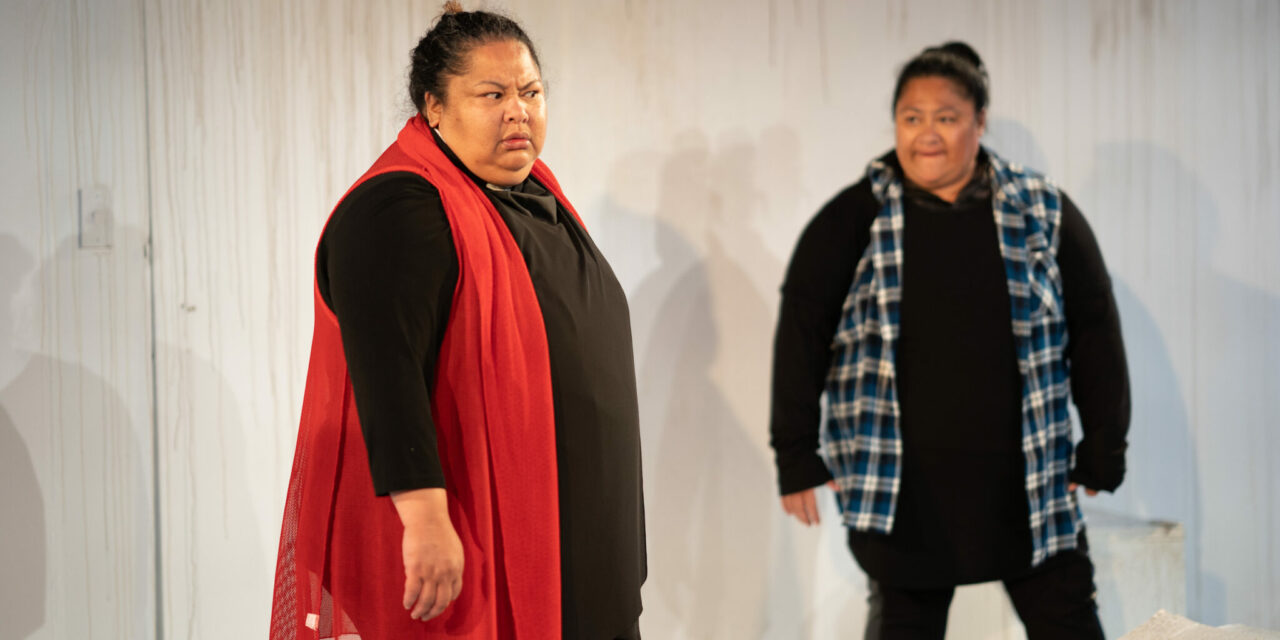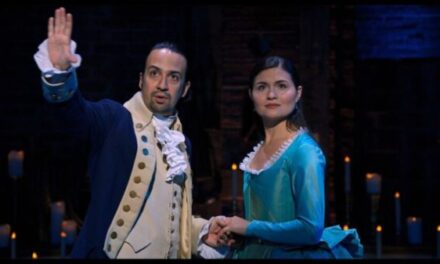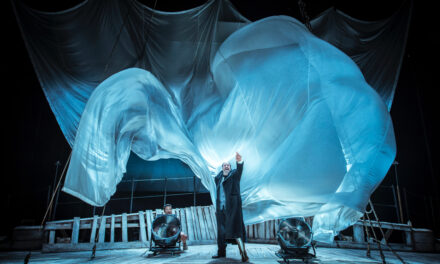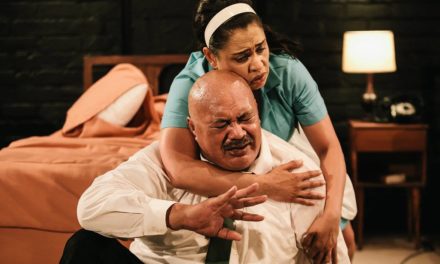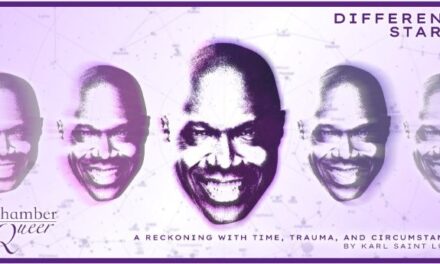Uma Lava by Victor Rodger, Circa Theatre, Wellington. 23 November – 7 December 2019. Directed by Vela Manusaute. Produced by F.C.C.
Playwright Victor Rodger writes from a Polynesian perspective and through his company F.C.C. continues to offer some of the most challenging new scripts performed in Aotearoa New Zealand. His play Club Paradiso, staged at BATS Theatre in August 2019, tested the boundaries of how much cruelty you can show onstage without completely alienating your audience. This unrelentingly bleak hostage drama depicted the devastating impact of violent crime in New Zealand society. The script used the intensity of a one-room setting (a bar in a poor neighborhood in South Auckland) to capture the terror of being trapped by a psychopathic killer (Robbie Magasiva) on a suicidal violence binge while on the run from the police. Club Paradiso reflected many real-life violent crimes that have occurred in New Zealand in recent years, such as the hostage drama at the Panmure RSA (Returned Serviceman’s Association) in December 2001, where a criminal under the influence of methamphetamine held a number of members and employees hostage, killing three of them and seriously injuring another. The play shocked audiences into awareness of the fact that the worst violent crimes often impact on the poorest and most vulnerable communities. For me, the most affecting memory of the production was of Anapela Polataivao’s strikingly contained, achingly credible portrait of the mother who tries to reason with the killer even as she sees her own children being victimized by him. [1]
Polataivao is also one of the stars of Rodger’s latest play Uma Lava, premiered at Circa Theatre on 23 November, produced by F.C.C. and directed by Vela Manusaute. The publicity warns “This show contains material that hopefully offends most people”, suggesting that the new play will echo the controversial shock tactics of Club Paradiso. Uma Lava, which translates to “eternity”, “forever” or “end” in Sāmoan, is a very different beast, an über-black comedy that explores existential angst while testing the limits of theatrical bad taste. Inspired by Jean-Paul Sartre’s existentialist drama No Exit (1944), it places three recently deceased Sāmoan characters in a version of hell that seems designed especially for Sāmoans, with a large tapa cloth hung stage right and a tiny fridge stocked with cans of corned beef.
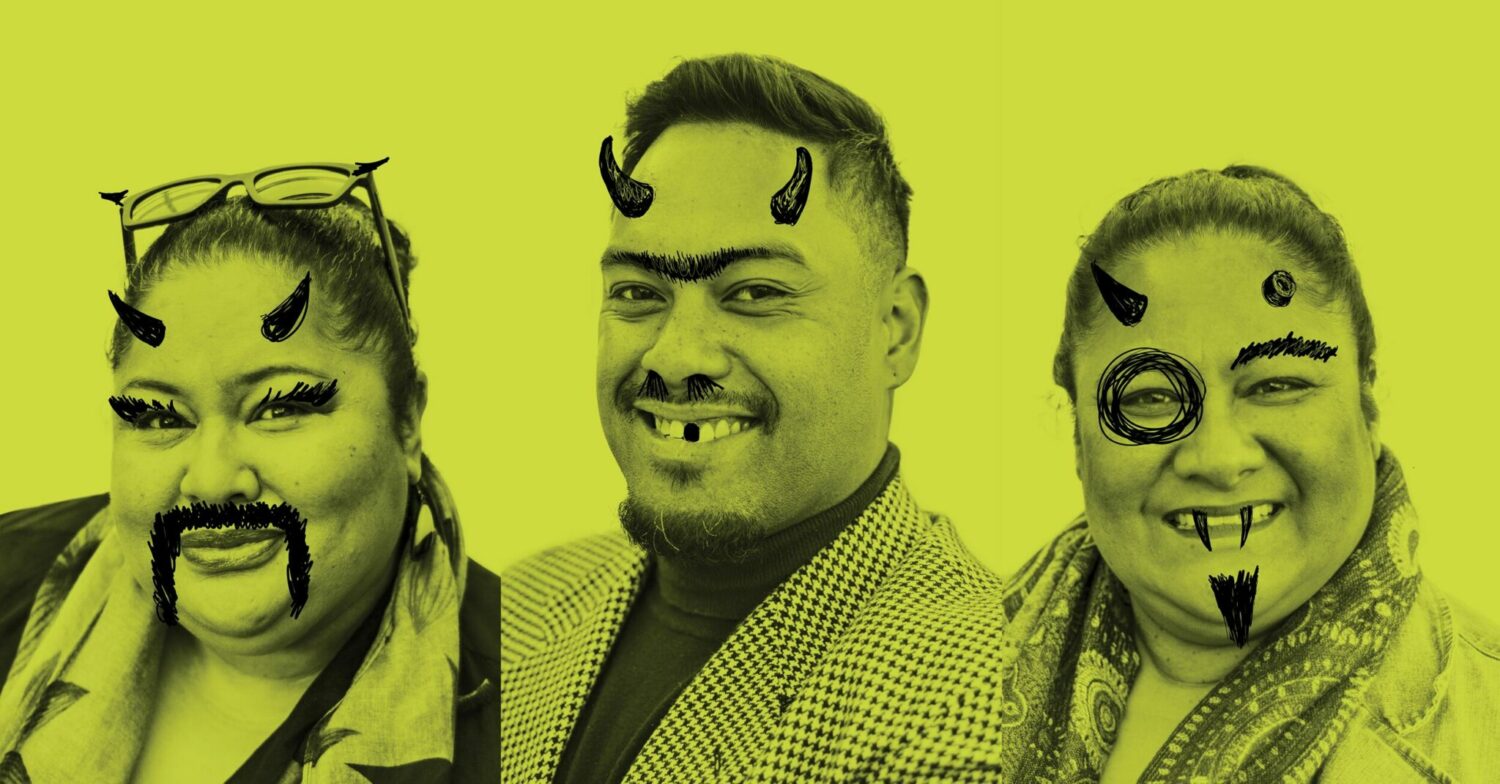
Stella (Goretti Chadwick), Garth (Mario Faumui) and Lina (Anapela Polataivao) in poster image for Uma Lava by Victor Rodger. Directed by Vela Manusaute. Circa Theatre 2019. Photo credit: Raymond Sagapolutele.
As in Club Paradiso, Rodger uses the claustrophobia of a single room setting to create an intense atmosphere of conflict, this time for comic effect. In the tight space of Circa’s studio theatre, the audience shares the sense of entrapment, beautifully realized in Sean Coyle’s soiled box set, off-white walls and distressed furniture stained with grimy waste. A central door has no handle and only opens through the agency of T.D. (The Devil), cannily portrayed with a smug sense of irony by Paul McLaughlin. T.D. ushers in the inmates of this hell one by one. Garth (Mario Faumui) is a right-wing politician from a fictional “One New Zealand” Party. He wears a bespoke suit and has appalling halitosis, the stench of which infects the room and reflects his poisonous attitudes. Garth has no wish to be identified as Sāmoan and has fully sold out to the Palagi (white European) hierarchy. On entering the room he gags at the sight of the tapa cloth but when he attempts to pull it down is warded off by an electric shock administered by some supernatural agency. The next to enter is Lina (Polataivao) a butch academic who instantly clashes with Garth’s politics. The third inmate Stella (Goretti Chadwick) is a disgraced minister of religion whose hilarious moral backflips satirize the power politics and hypocrisy of organized religion. Rodger triggers these character conflicts with explosive effect, keeping the audience on the edge of transgressive laughter. Rodger hilariously traverses various sensitive topics such as gay conversion therapy, Sāmoan cosmology, mixed-race identity, Christian religion and academic tenure with total disregard for political correctness. The actors relish every moment of this with dazzling exchanges of inspired and profane abuse. Manusaute’s direction perfectly matches the tone of the script, creating a plausible absurdist world and punctuating the character dynamics by drawing fiery yet focused performances from his actors. Long-time collaborators Polataivao and Chadwick are both formidable performers, whether doing comedy or straight drama. Here they display the charged comic teamwork that made their comedy duo Pani and Pani so successful. Both were staff members at the now-closed Pacific Institute of Performing Arts (PIPA), which for several years excelled at training Polynesian performers in Auckland. PIPA graduate Faumui more than holds his own with his two former teachers, depicting his slimy politician with relish and firing off barbed comments with comic precision.
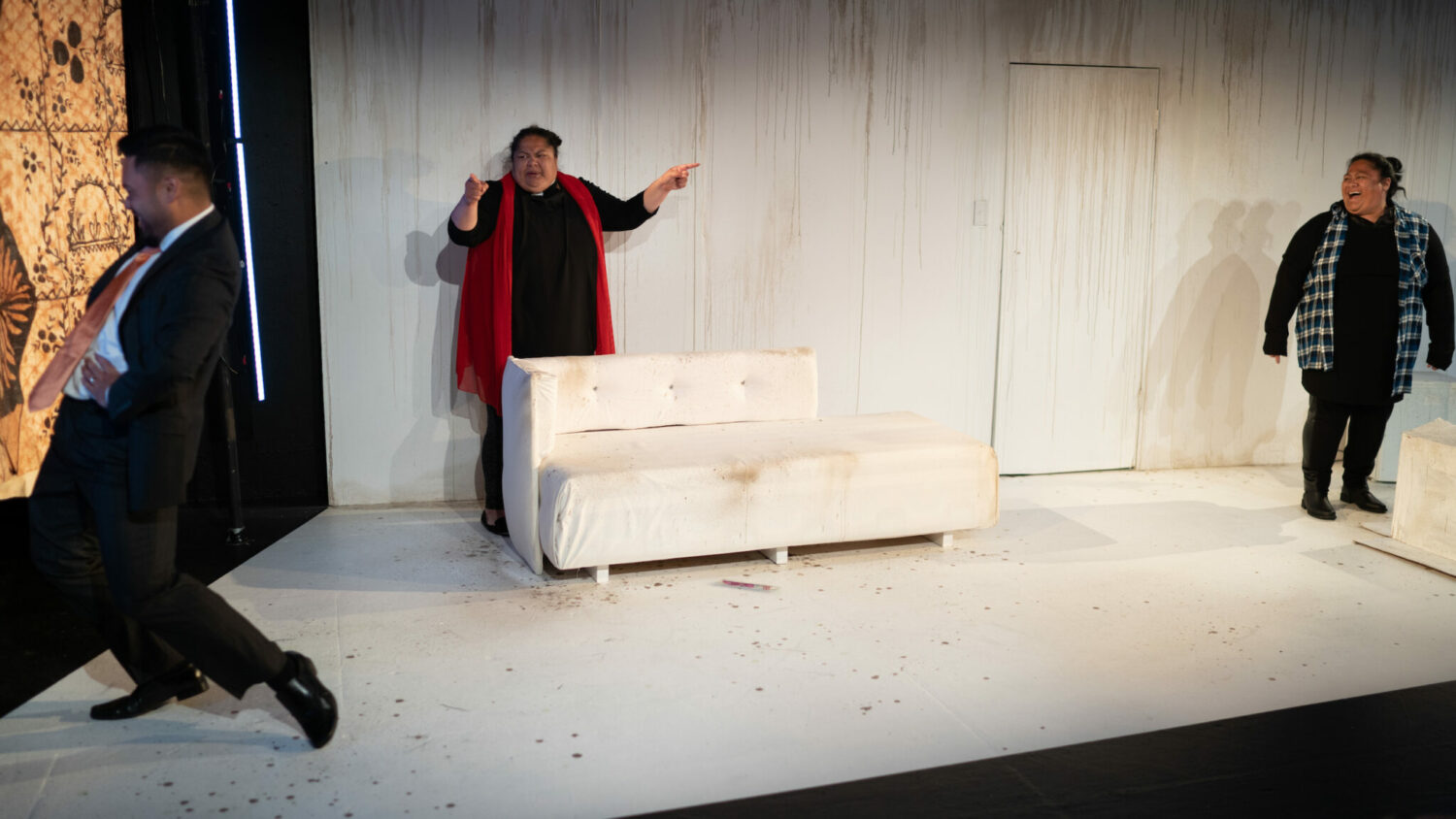
Garth (Mario Faumui), Stella (Goretti Chadwick) and Lina (Anapela Polataivao) in Uma Lava by Victor Rodger. Directed by Vela Manusaute. Circa Theatre 2019. Photo credit: Paul McLaughlin.
The stylistic ingredients of the Theatre of the Absurd are freely peppered through the action. Reminiscent of the endless daylight of Samuel Beckett’s Happy Days (1961), the light switch doesn’t work so there is no rest for the characters, who find they cannot close their eyes even for a moment. They and we are reminded “This is forever” and “eternity is no joke”, and we begin to imagine what torment it would be to be locked up with such unpleasant people in perpetuity. Their crimes and misdemeanors are re-played on a giant video like an Orwellian nightmare. Occasional bursts of intense burning on the soundtrack evoke the fires of hell and the increasing heat in the room. A mysterious upturned cardboard box conceals an essential appliance, later used later to hilarious effect. One of my favorite moments occurs when Chadwick executes a Marcel Marceau-style mime routine with the fourth wall, drawing attention both to the entrapment of the characters and the audience’s willingness to believe in this tired convention of box set realism.
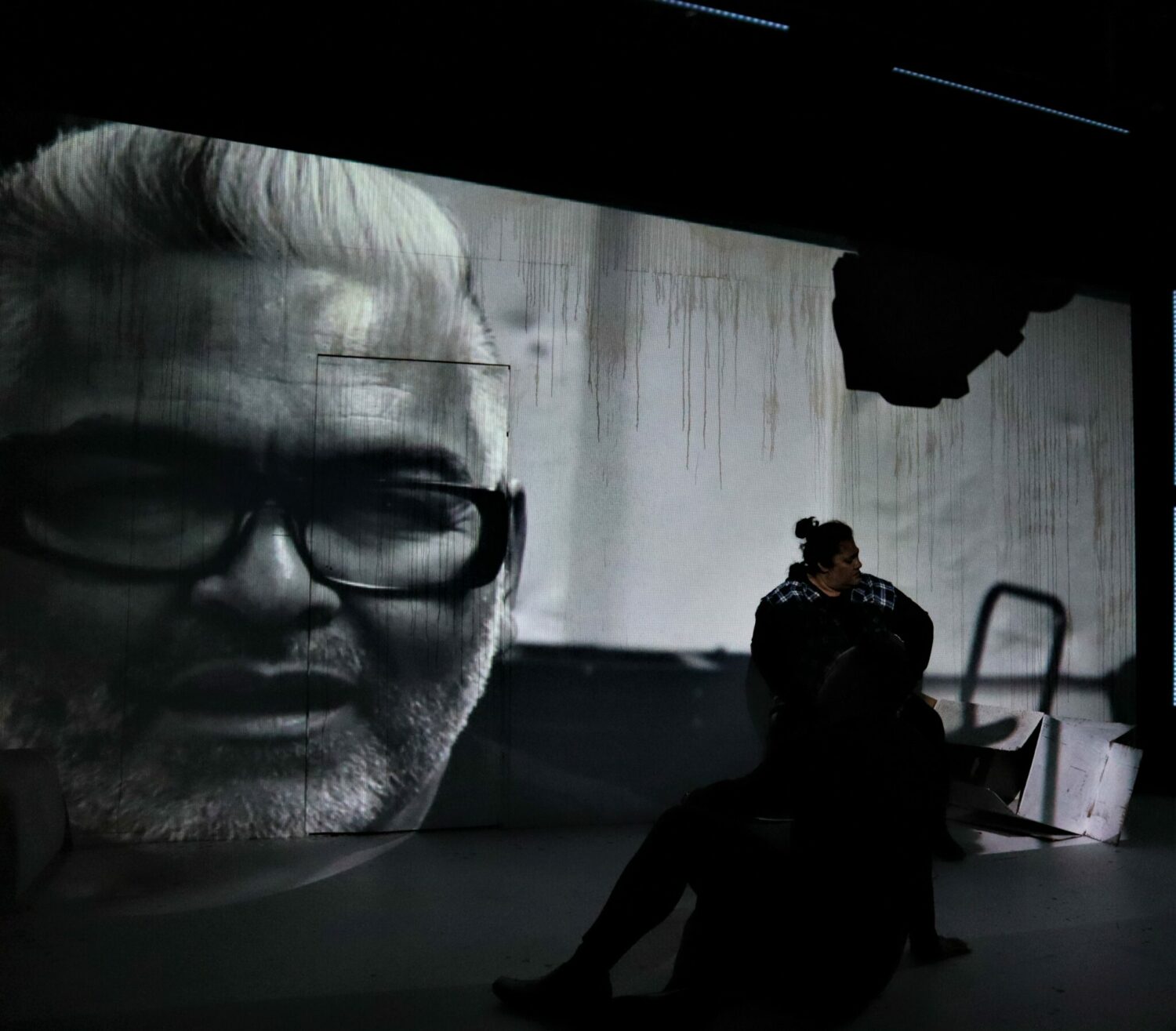
Lina (Anapela Polataivao) with Victor Rodger (video projection) in Uma Lava by Victor Rodger. Directed by Vela Manusaute. Circa Theatre 2019. Photo credit: Vela Manusaute.
On the way home my mind was spinning with possible interpretations lurking beneath the comic extravagances of Uma Lava. Most obviously, the play echoes Sartre’s most famous line from No Exit, “hell is other people”, with its bleak sense of human beings as inherently anti-social, self-interested and hypocritical. As the characters represent politics, education, and religion, it could suggest a dysfunctional society where the main institutions stick to their silos and refuse to co-operate with each other. The fact that the all-controlling Devil is played by the one Palagi (white) actor with an amused sense of superiority could reflect lingering racist attitudes among New Zealand’s white majority towards Pacific Island migrants. Uma Lava blows apart lingering stereotypes that homogenize and marginalize Pacific migrants, stressing that Sāmoan people are as diverse and contradictory as anybody else. This was summed up beautifully by reviewer Sepe Mua’au, who wrote, “As a New Zealand born Sāmoan artist working in theatre, I appreciate so much seeing a piece of a Pacific artist’s work being shown in which characters are not typecast, are not written purely based on the colour of their skin or even as their experience as PI [Pacific Islanders], but who are humans first and ethnicity second.” Even while portraying absurdist extremities of behavior and the inability of people to empathize with each other, the play paradoxically reinforces the humanity of its characters and takes a massive step away from the racial profiling that often dominates both public and private discourses in New Zealand. In Club Paradiso, Victor Rodger took us unapologetically to the dark side. In Uma Lava, he tackles more darkness but through the light touch of his humor provides a more nuanced and intellectually challenging experience. Despite its cynical depiction of human behavior, Uma Lava has a joyful, anarchic quality, and shows again that there are few playwrights in New Zealand with the sheer wit, intelligence, and audacity of Victor Rodger.
[1] Polataivao’s innovative contribution to New Zealand theatre was acknowledged when she won the Contemporary Pacific Artist award at the 2019 Creative New Zealand Arts Pasifika Awards.
This post was written by the author in their personal capacity.The opinions expressed in this article are the author’s own and do not reflect the view of The Theatre Times, their staff or collaborators.
This post was written by David O'Donnell.
The views expressed here belong to the author and do not necessarily reflect our views and opinions.

